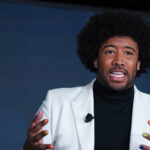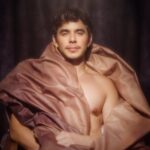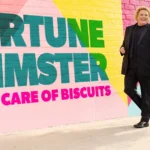Tom Goss is learning to like The Happy Accident.
As we speak, Goss is getting the first shows of a new tour under his belt. And these concerts — like the new Territories album they highlight — mark a 180-degree turn from anything he’s attempted before.
(Give a listen to Territories on Spotify here)
To hear Goss tell it, he’d been using his guitar as armor for so long he felt naked onstage without it. But then something happened that changed everything.
Renowned as one of the most visibly off-the-market troubadours on the gay music circuit, Goss walked in to find his husband cheating on him. They’ve been together 14 years, and married for nine.
Always is Not Forever
The revelation threw him into a tailspin. So much of his six-album discography glowingly touts his one-on-one bond with husband Mike. Knowing those songs can never be heard again the same way, he had plenty to consider.
They could have called it quits then and there; many do. Instead, Goss and his husband decided to rethink their union, and after some soul searching, they launched a 2.0 version of their marriage as “an open relationship — with boundaries.”
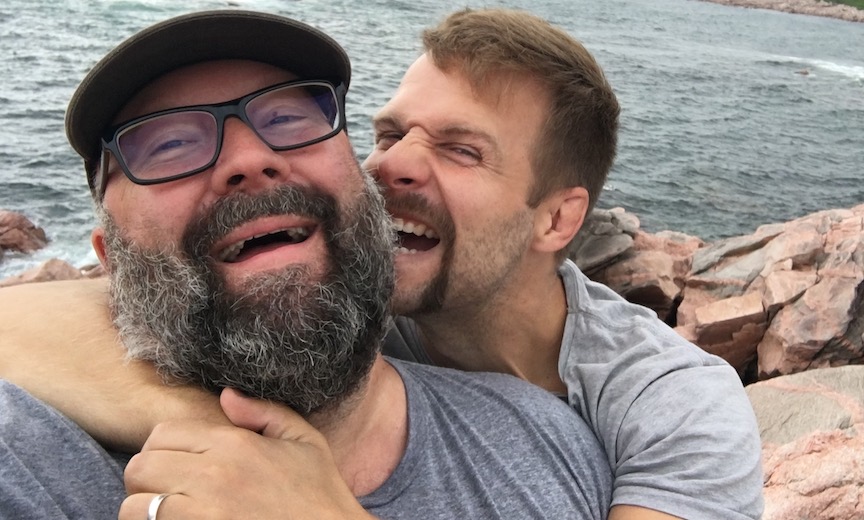
(Photo courtesy Tom Goss)
That renegotiation undergirds the most adventurous Tom Goss album ever, and their new shared reality has become a metaphor for life without a net. Serendipitously, living a less predictable life also helped Tom find his inner daredevil.
Read Next | NYC Bath Houses Are Back, and Gay Men Are Cruising Them Once More
Of course, self-reflection is vital for a musician who writes from life experience and leans on words like “intentional” to convey a deliberative nature. But its meaning seems to have shifted lately. These days, his “intentional” means making informed choices as well as mastering feats of determination.
“Well, making Territories hasn’t been easy,” says its composer. “But it has been interesting. This record has been very uncomfortable, because the artistic journey came after the emotional journey, and that really started with “Berlin.'”
New Territories
In a music video that evokes Erotica-era Madonna, “Berlin” drapes synths and singers over a backdrop of sensory delights. There, in a city known for its libertine pastimes, Goss tumbles headlong into an overnight romance. And, in case you’re a longtime fan who thinks he’s only watching Tom’s fantasy play out, the short ends with the pair whispering, “I love you” to each other.
“For me, sexuality and intimacy are a part of caring for someone,” he confides. “If someone’s not nice, it doesn’t matter how hot they are; I’m not interested. The experience of learning what my husband wanted triggered my own journey. I realized I’m not capable of being physical with someone without having an emotional entanglement.”
New Vistas
Since he couldn’t go back, Goss decided to see what the unknown present might hold. And the more the rabbit hole telescoped away, the more he had to know what was down there — inside him.
- (Photo courtesy Franz Szony/Tom Goss)
- (Photo courtesy Joey James/Tom Goss)
- (Photo courtesy Franz Szony/Tom Goss)
“I’m always going to be introspective, you know,” he laughs. “I started making music because I wasn’t satisfied with the messages I was hearing around me. Music impacts our lives in a way that goes past understanding. If I was using my music simply to make money and become famous, I sure wouldn’t have made the records I have made up until now. I always want to be tackling deeper truths and keep the main focus on being honest, being very intentional and asking everyone, including myself, to think.”
Tom Goss has been thinking for a very long time.
Getting a Grip
Goss was born in 1981 to a Catholic pair of gymnasium owners in Quincy, Illinois. As the middle brother of three, he describes himself as “a pleaser who’s incapable pleasing anyone. My parents divorced and both remarried. But my brothers and I were born almost within 30 days of each other, two years apart. We did almost everything together.”
Athletics were woven into the Goss family DNA, and at an early age little Tom started training three or four hours a day, four or five days a week. Generally, he played several sports at a time, and developed a competitive streak that persists to this day.
More Content from Metrosource[wpp range=”last10days” cat=’16259,26,19687′ thumbnail_width=75 thumbnail_height=50 limit=3 stats_views=0]
Having a locomotive body and a sharp personality at his command very quickly became a problem: “I was a terror,” he admits. “I really felt misunderstood and invisible a lot of the time. I couldn’t please anyone, and didn’t understand why.”
Always “an instigator,” Goss dug a deep well and filled it with rage. “Being an athlete, I was used to being physical, aggressive and strong,” says Goss. “I’ve always been one of the best. Maybe it was about entering the male-dominated alpha world of adolescence, but I started getting into fights with people at school — including my coaches — and getting arrested for assault and disorderly conduct. Remember Jenny Jones? That was me. I don’t think anything happens in a vacuum, though. There were certainly a lot of external things going on, but the vast majority was me and my failure to integrate my differentness with the world around me.”
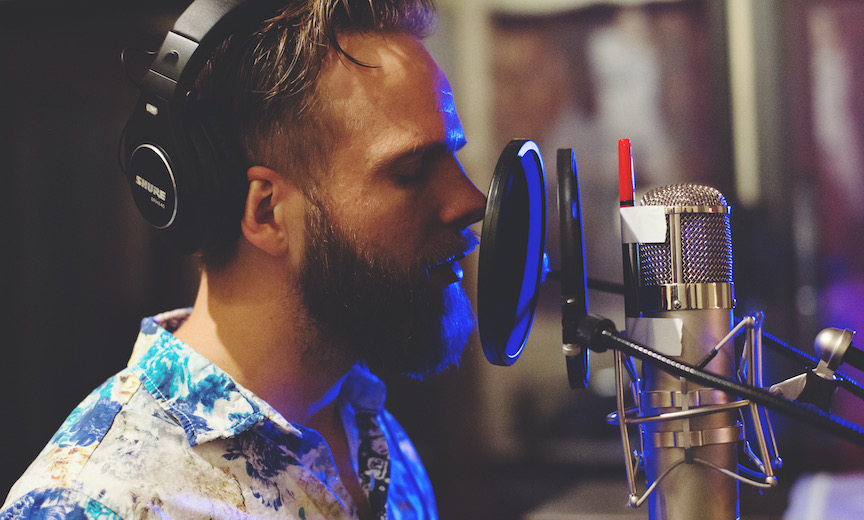
(Photo courtesy Lorelei Rubik/Tom Goss)
Switching Off
He was expelled in 9th grade and placed in an alternative school (“kind of a holdover for kids from juvie,” he’ll say) that accommodated troubled kids who couldn’t play well with others.
Unlike most, Goss looked around and decided, “this is not the direction my life should be heading.” He took his rage internal, then turned to wrestling as a physical outlet.
Insofar as sexuality was concerned, Goss says he didn’t have any. “I shut it off like a switch,” he says. Redirected, his physical prowess soon won him friends and the favorable notice of coaches. But he still felt like an outsider. “We’d be talking about life, society, economics and religion. And if I’d say, ‘I’m not really sure I see it the same way,’ their response would be, ‘Oh, we understand what you’re saying, but you don’t really count. You’re different.’ So I got used to being interesting but irrelevant and completely discounted. I still feel like that a lot.”
That pattern continued through college in Missouri. “I was turning myself off,” he shrugs. “Since I was an athlete, I showered with 60 guys a day. These are earnest, fit, young and beautiful midwesterners — the people you would want to see in fashion or porn magazines. And I wasn’t attracted to them. I literally didn’t think I had that drive. I thought the world was lying about love, since I’d never felt it. So I made good friends, men and women, and was more interested in the person than the package they appeared in.”
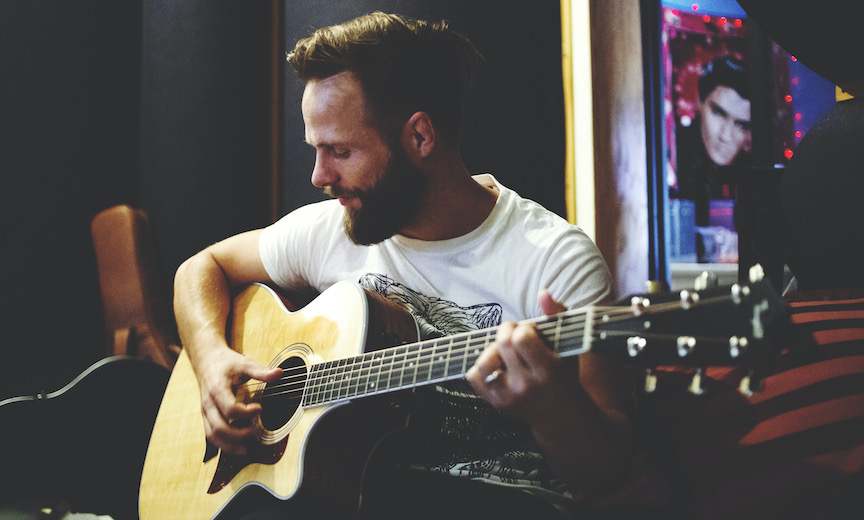
(Photo courtesy Lorelei Rubik/Tom Goss)
Critical Mass
It made perfect sense then that Goss would enter the seminary upon graduation.”The idea of moving back to Wisconsin, marrying a girl and coaching or teaching seemed completely suffocating to me,” he says in retrospect. The idea of being a priest calmed my heart. It seemed like I was choosing my own path.”
For many, the biggest detriment to the priesthood is celibacy. “But I was already celibate,” Goss maintains. “I wasn’t dating. I wasn’t even masturbating.” Ironically enough, it was at seminary in DC that he fell in love for the first time — with a man he describes as funny, shy and chubby. “We fell in love,” he says, “and for the first time I felt sexual attraction. It wasn’t that I was asexual. It was that I’m attracted to chubby guys.”

(Photo courtesy Joey James/Tom Goss)
Their affair continued on the DL. “And one night, I found one of the guys I was living with standing at the foot of my bed, watching me sleep. I mean, we were supposed to be brothers, right? This kind of behavior had been escalating for a while. Even though I was getting more and more uncomfortable, I had to be in close contact all day every day. I would eat every single meal with him, see him at mass, prayer, meetings — everywhere.”
Looking back, Goss says, “I’ve never been raped, but I have a little understanding of that fear. I certainly was fearful. I was living three feet away. We shared a wall and he was doing whatever he could to make sexual advances towards me. It was horrible, and after he showed up in my room, I finally started talking about it. Once the people in the house heard about what was going on, he got kicked out, and less than a week later I had someone else doing the same thing.”
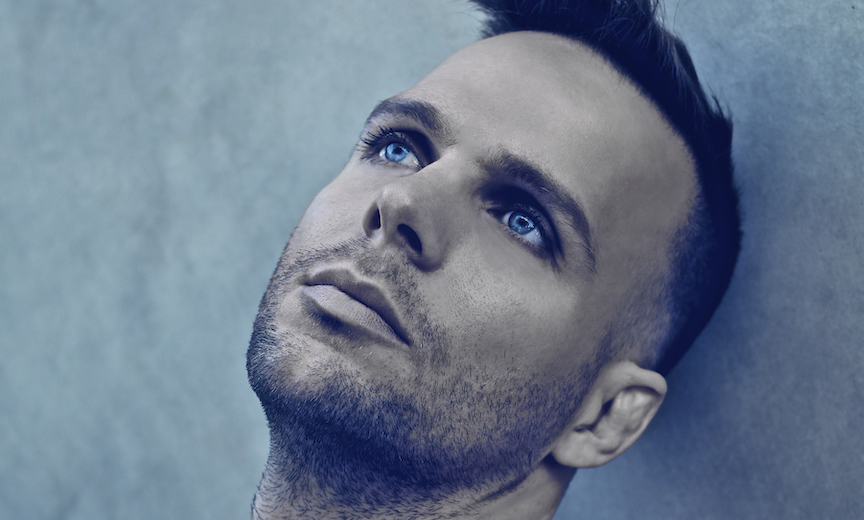
(Image courtesy Venfield 8/Tom Goss)
A Different Calling
Because the church condones homosexuality privately and condemns it in public, his fellow seminarians began to shun him for breaking their code of silence. Once again, he was voiceless and invisible. “That was the moment I realized this is not an environment for me,” he says. “It was damaging and unhealthy and so I quit, and 24 hours later, I found a place to live, packed my bags and moved. Everybody immediately disappeared from my life. I think they saw my independence and not being quiet as dangerous for them.”
Now Goss says he’s grateful for the experience because “had they not done what they did, I might have spent years in the wrong place.”
That’s when he decided to make music. As a teenager, Goss followed Dave Matthews Band across the country and had a huge thing for the music of Seal. Now, with nothing more than a job at Starbucks, he decided to make a record. And a few weeks after leaving seminary, he met his husband Mike on Yahoo personals.
Naked
Goss released his first album, Naked Without, in 2006, “without any idea what I was doing. But once I’d done it, I wanted to play it live, then make a video and go on tour. It all just snowballed from there. As I toured, I got to meet amazing people living their dreams who were wounded just like me. Finding people with less and from worse circumstances, and getting to see their brilliance and success? It’s one of the most inspirational things you can imagine.”
Over the last decade as a singer/songwriter, Goss has documented his marriage (“You Know That I Love You” from 2012), his attraction (“Bears” the following year) and domestic violence (in “La Bufadora” featuring Daniel Franzese). Now when Goss bounds out onto the stage, he’s also stepping out of his own shadow.
It’s Intentional
“I’ve spent a lot of time in my career being afraid of what people thought,” he’ll say. “And honestly, I wasn’t sure I could pull this show off. I thought there’d be people who wouldn’t understand it. Being someone who is a multi-instrumentalist, I’ve had my own judgements about not playing instruments when singing. But I’ve come to realize it doesn’t matter. To stand there and have the music move through you without anything but your vocal skills? It’s become transformational. For me, shedding the guitar was like shedding a shield, and learning how to access a more honest, more emotional side of myself. I think that’s made the show exponentially better.”
As David Bowie once said, “Aging is an extraordinary process where you become the person you always should have been.”
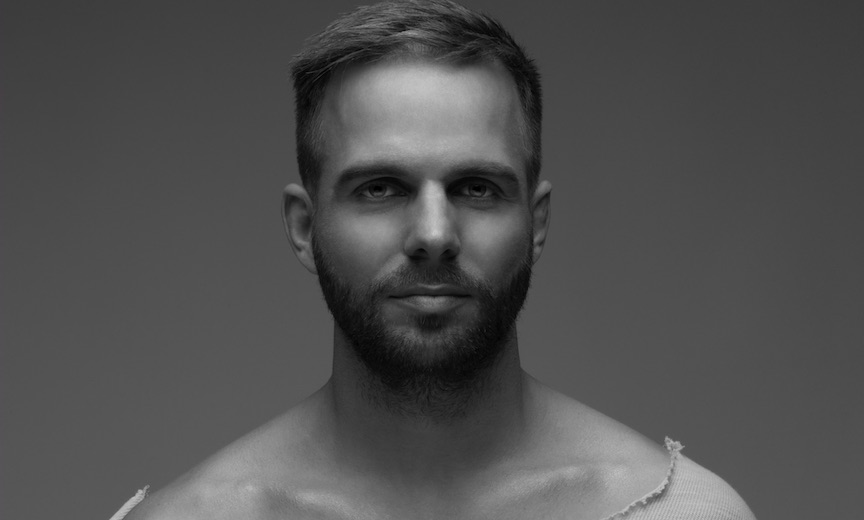
(Photo courtesy Franz Szony/Tom Goss)
Seeing 20/20
If this is a moment of clarity, Goss is making the most of it. Having come out to his family years ago by letter, he actually invited them to see his new show recently in Chicago.
“My whole family came to see me perform,” he says with a smile. “And I began the show talking about opening up my relationship, which is not really something you want to have your mother in the audience for.”
As the show began, “I was trying hard not to focus on them, I was trying to be invisible to them. Then I caught myself, and thought, ‘No, if you feel unseen and unheard you need to be performing only to them. Shine so brightly they can’t ignore you. I was so big and so open and so honest, I had one of the most incredible shows of my life.”
Then he and his family then met up for dinner, he laughs, “and no one mentioned it. Not a word. But you know what? That’s okay. I think that I need to write songs, make videos, painfully reveal my heart to the world. That’s not who they are. But that’s who I am.”
Want Metrosource LGBTQ content notifications? Sign up for MetroEspresso.
Last modified: August 4, 2020









